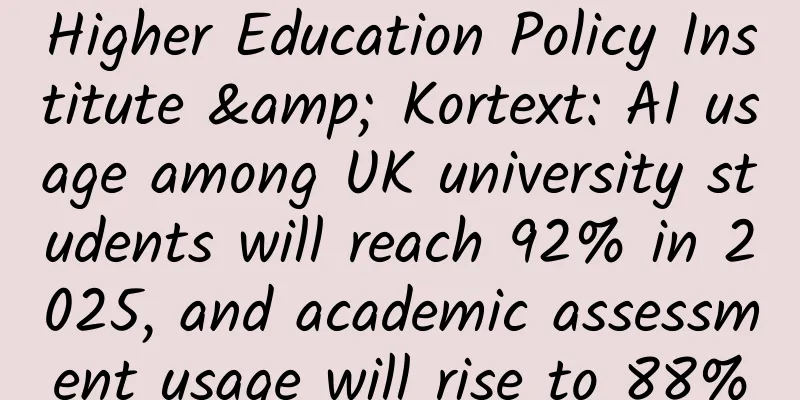Higher Education Policy Institute & Kortext: AI usage among UK university students will reach 92% in 2025, and academic assessment usage will rise to 88%

|
According to the latest research, the use of generative artificial intelligence (genAI) in the study of British university students has reached an astonishing 92%. The study, jointly released by the Higher Education Policy Institute and digital electronic textbook supplier Kortext, surveyed 1,000 domestic and foreign students and found that the use of generative artificial intelligence has surged in the past 12 months, and almost all undergraduates are actively using these tools. In the 2025 survey, 88% of students said they used AI tools like ChatGPT in academic assessments, up from just 53% last year. The percentage of students using any type of AI tool also soared from 66% in 2024 to 92%, which means that only 8% of students did not use AI. Josh Freeman, the author of the report, said that this change in just one year is unprecedented, and universities should pay attention to it and realize that generative AI has become the norm. Freeman also pointed out that universities must "stress test" all assessments to ensure that the assessment content is not easily completed by AI. This will require bold retraining of faculty and staff to help them understand the power and potential of generative artificial intelligence. He suggested that best practices should be shared between institutions so that AI tools can be effectively used to promote learning rather than hinder learning. Many students said that the main reasons they used generative AI were to save time (51%) and improve the quality of their work (50%). However, about 18% of students admitted to directly including AI-generated text in their assignments. Despite this, some students are still concerned about the risk of academic misconduct, and some said that although they enjoy the convenience of working with AI, they are also afraid of being discovered. The survey also showed that students from wealthy backgrounds and students majoring in STEM are more active in using AI tools. In addition, although 80% of students believe that the school's policy on academic integrity is "clear", only 36% of students have received AI skills training provided by the university. Many students feel that the school's guidance on this issue is unclear. Dr. Thomas Lancas, a computer scientist at Imperial College, said that students who do not currently use generative AI have become a tiny minority, and he stressed that being able to use AI proficiently will become a competitive advantage in the future workplace. A spokesperson for the university body said that in order to train future talent, universities must prepare students for a world dominated by AI while also paying attention to the challenges posed by rapidly evolving technologies. The survey results show that both universities and students are concerned about the risks that AI tools may bring in exams and assessments. Latest processor |
<<: Chery Fengyun T9 and BYD Song L DM-i, which one is more worth buying?
>>: Looking ahead to Android 2017: These innovations are ahead of Apple
Recommend
Top 10 keywords for breaking through brand traffic in 2021!
As the consumption environment evolves, how can n...
Inventory | 5 major user fission growth models!
What do you think of when you mention fission gro...
The “User Cultivation” Model on the Internet (I)
Have you ever thought that you are being "cu...
The marketing secrets of Tencent advertising for second-tier e-commerce companies
Electronic commerce, referred to as "e-comme...
4 tips to improve the work efficiency of operators!
The operations staff are all young people, so rap...
Can load-bearing walls be demolished? Demolishing the wrong wall can have serious consequences!
Recently, a resident in a residential area in Har...
Samsung's bomb-like S8 successfully survived after refurbishment, and the Note7 costing 2,000 yuan or 5,000 yuan. Which one would you choose?
Seven months after the explosion, Samsung has an ...
WWDC2017 has ended, and CP needs to pay attention to the major adjustments to the iTunes Connect developer background!
Apple's WWDC 2017 Developer Conference has at...
How do plants without mouths "eat" nutrients?
Do plants also have mouths? Of course, if plants ...
Whether you want to lose weight or maintain your figure, don’t fall into these “nutritional misunderstandings”!
Xiaofang is a girl who loves beauty. In order to ...
Tiktok overseas version short video operation tutorial (Apple/Android), help domestic users to watch the overseas version of TikTok
Tiktok overseas version short video operation tut...
The goldfish has been wronged for so long, will it really eat to death?
Goldfish don’t die from being “overfed”, they die...
Amid internal and external troubles, is Samsung considering splitting up and rebuilding itself or cutting off its arms in the short term?
On November 29, Samsung announced that it was con...
Xiaohongshu Promotion丨How to quickly create popular notes!
I have a strong interest in customer acquisition,...
If you want to run a successful e-commerce event, start with these aspects!
So far, the author has been working in the fresh f...









